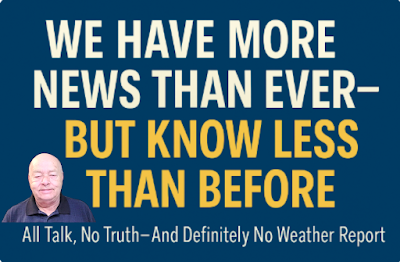We Have More News Than Ever—But Know Less Than Before
Why Today’s News Leaves Us Informed, But Not Enlightened
Remember when “no news is good news” meant your life was going just fine—no disasters, no scandals, and no alien invasions? Ah, the good ol’ days. Back then, the evening news came on at 6, lasted 30 minutes, and wrapped up with a heartwarming segment about a cat that dialed 911 to save its owner. Now we have 24-hour news on every screen imaginable—and somehow, we know less about what’s actually happening in the world.
We’re swimming in headlines, drowning in breaking news banners, and yet, most of us are still wondering what the heck is actually going on. Why? - Because what we’re getting isn’t news—it’s a nonstop parade of political theater, served with a side of bias and a sprinkle of panic.
24/7 Coverage, Zero Substance?
Flip through the channels. You've got networks that lean so far left they’ve practically tripped over Karl Marx’s beard. And others so far right they’d high-five a statue of Ronald Reagan before breakfast. But here’s the kicker - they’re all talking about the same stories, just wearing different-colored glasses.
Breaking news? Not really. It’s more like breaking narratives. Today’s newsrooms have become opinion factories, churning out analysis, spin, and enough “expert panels” to fill a football roster. There are more people talking about the news than people reporting it.
Want a simple summary of a natural disaster, international event, or scientific breakthrough? Good luck. You’ll have to scroll past 18 think pieces on how it somehow proves one political party is evil incarnate.
When Did News Become an Echo Chamber?
There was a time when journalists chased stories, checked facts, and let the chips fall where they may. Today, it’s more like: “What does our audience want to hear? Great—write that.” News outlets aren’t just reporting to the public anymore—they’re rallying their respective teams. It’s not “inform the viewer,” it’s “mobilize the base.”
Even worse, we’ve created our own personal echo chambers. If you're a left-leaner, you probably wouldn’t be caught dead watching that other network. And if you're right-leaning, you’ve got your own echo chamber filled with outrage and confirmation bias. Algorithms serve us what we want to hear. It’s like a buffet—but every dish tastes like your opinion already.
The Disappearing Act of Real Stories
In the background of all this political ping-pong, real news—actual events that matter—quietly fades away. Infrastructure bills, climate research, small-town heroics, medical breakthroughs? Unless it can be weaponized politically, it’s buried under the latest scandal or gaffe.
Ironically, we’re more connected than ever, yet completely disconnected from what's real. Somewhere in the chaos, the line between journalism and entertainment got blurred. Now, “news” is just another genre on the TV guide—right between “reality show” and “true crime.”
So - What Can We Do About It?
Start by asking questions. Lots of them. If you see a headline that seems tailor-made to rile you up, take a breath and dig deeper. Check the source. Look for who’s quoted—and who’s conveniently left out. Seek out coverage from places that aren’t trying to sell you a political emotion. And maybe—just maybe—try turning it off once in a while. (Yes, even during an election year. You’ll survive. Probably.)
And for the love of unbiased curiosity, let’s bring back a little balance. Not everything has to be a crisis, a conspiracy, or a campaign ad in disguise.
Final Thought - So, is no news still good news? Maybe. But in a world full of political noise dressed as journalism, real news—objective, factual, thoughtful reporting—would be a breath of fresh air.
Stay safe, stay secure and unfortunately, until that returns, we’ll be stuck in the 24-hour “opinion cycle,” where the only thing truly breaking is our trust.
(AI was used to aid in the creation of this article.)
"I'll see you again soon. Bye-bye and thanks for reading watching and listening."

.png)
Comments